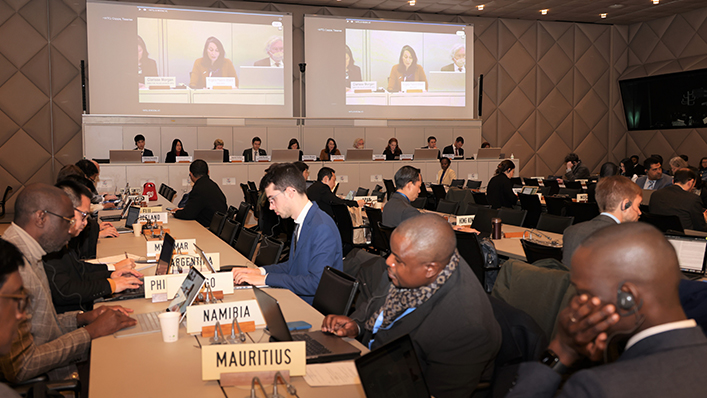
“We all know that the availability of data has been a challenge since the beginning of the WTO fisheries subsidies negotiations. Members frequently have noted that a better and more detailed understanding of the state of fisheries resources around the world, as well as the amounts and types of fisheries subsidies being provided by governments, would help to inform and bring greater focus to members’ proposals and the Negotiating Group on Rules’ debates,” DDG Ellard said in her opening remarks for the workshop. A previous workshop held in November focused on an overview of the key disciplines in the Agreement on Fisheries Subsidies and best practices for and challenges in implementing the Agreement.
Audun Lem, Deputy Director of the Fisheries and Aquaculture Division of the UN Food and Agriculture Organization, likewise emphasized the importance of data in his opening remarks: “Effective management anticipates the public sector playing a significant role in stock assessment, research, enforcement, monitoring, reporting, and institutional capacity building.” He also assured members of support and collaboration from the FAO for stock assessments and other efforts related to implementing the Agreement on Fisheries Subsidies.
Members heard presentations from experts from governments and intergovernmental organizations providing national, regional, and global perspectives on data concerning the state of marine fisheries and subsidies to marine fishing. Members also had the opportunity to share their own reflections and experiences.
WTO members adopted the Agreement at the 12th Ministerial Conference (MC12) held in June 2022. For the Agreement to become operational, two-thirds of members have to deposit their “instruments of acceptance” with the WTO. Members also agreed at MC12 to continue negotiations on outstanding issues such as disciplines on subsidies contributing to overcapacity and overfishing with a view to making recommendations by MC13 to further enhance the disciplines of the Agreement.
DDG Ellard recalled that members expressed their desire at a fisheries subsidies retreat held in October 2022 to conclude the second wave of negotiations by MC13. “As this is just over a year from now – in late February 2024 – we really have our work cut out for us,” she said. She also highlighted the importance of the WTO’s Fisheries Funding Mechanism created as part of the Agreement to help developing and least developed members in implementing the Agreement and complying with the data obligations.
DDG Ellard further urged more members to formally submit their acceptance of the Agreement, noting that Switzerland was the first to do so, in January . “I hope that this first acceptance will create real momentum for additional acceptances by members. The sooner we reach the threshold of two-thirds of members, the sooner the Agreement will enter into force and start delivering its benefits for ocean sustainability and those who depend on it.”
While interventions highlighted challenges associated with data collection, they also indicated a strong commitment by members to increasing knowledge about their fish stocks and enhancing their understanding of the impact of different fisheries management measures. Experts detailed how a strategic approach to data collection, such as through sampling, can help members make best use of limited resources.
Members also heard how different types of government support can affect fisheries sustainability, and how data can support decision making for revitalizing fisheries stocks. The presentations also underlined the gaps in available data on fisheries subsidies and demonstrated how several members have collected and reported data despite challenges. Various programmes and donor support, including through the WTO’s Fisheries Funding Mechanism, are also available for data collection, the speakers noted.
Closing the workshop, DDG Ellard said: “Data is information to decision makers. The better the data, the better those decisions.”
Share
Reach us to explore global export and import deals